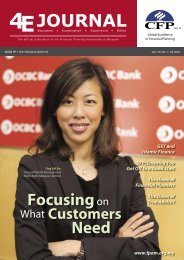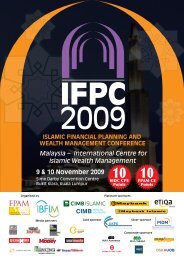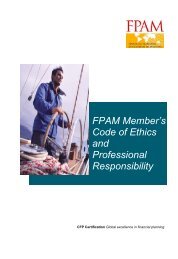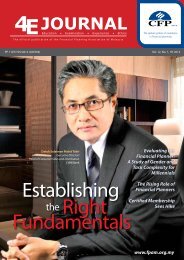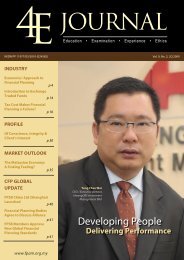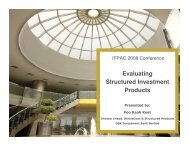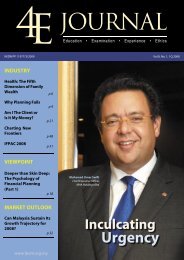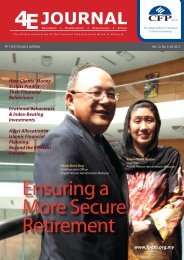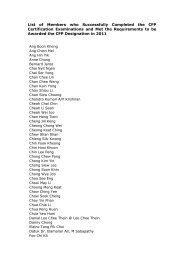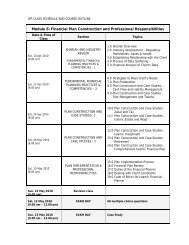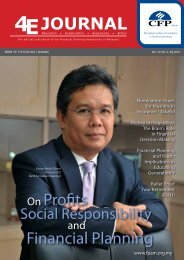Vol 10, No 3 - Financial Planning Association of Malaysia
Vol 10, No 3 - Financial Planning Association of Malaysia
Vol 10, No 3 - Financial Planning Association of Malaysia
Create successful ePaper yourself
Turn your PDF publications into a flip-book with our unique Google optimized e-Paper software.
ISLAMIC FINANCE<br />
July - September 20<strong>10</strong><br />
The Doctrine <strong>of</strong> ‘Aul and<br />
Its Impact on Estate <strong>Planning</strong><br />
By Azman Ismail<br />
“A particular aspect<br />
that has attracted<br />
attention among<br />
financial planners is<br />
the one related to the<br />
distribution <strong>of</strong> estate in<br />
Islam. This is especially<br />
true among those who<br />
specialise in estate<br />
planning.”<br />
The awareness and interest in Islamic<br />
financial planning has grown<br />
steadily and there are now many<br />
financial planners who have attended<br />
the Islamic <strong>Financial</strong> <strong>Planning</strong> courses.<br />
A particular aspect that has attracted<br />
attention among financial planners is<br />
the one related to the distribution <strong>of</strong><br />
estate in Islam. This is especially true<br />
among those who specialise in estate<br />
planning. However, there are only a few<br />
financial planners who are involved in,<br />
more so who understand, the various<br />
components <strong>of</strong> Islamic estate planning<br />
especially the one related to the Islamic<br />
law on distribution <strong>of</strong> estate. (For an initial<br />
understanding <strong>of</strong> the subject see author’s<br />
article, ‘Faraid – The Missing Link’, Personal<br />
Money, February 2003)<br />
One aspect <strong>of</strong> the Islamic law <strong>of</strong><br />
distribution that will have an impact on<br />
estate planning relates to the distribution<br />
<strong>of</strong> estate; where when the shares <strong>of</strong> the<br />
Quranic heirs (i.e. heirs that are determined<br />
by the Quran) are added together, the<br />
sum equals to more than one. To solve<br />
this problem, Muslim scholars resort to<br />
the doctrine <strong>of</strong> ‘aul. ‘Aul literally means<br />
“increase” and the doctrine <strong>of</strong> ‘aul states that<br />
when the shares allocated by the Quran<br />
to the various heirs when added together<br />
amounts to more than one, their shares are<br />
subjected to a proportionate abatement<br />
by increasing the common denominator.<br />
What this means is that the shares <strong>of</strong> the<br />
Quranic heirs are proportionately reduced<br />
so that each heir now gets less than what is<br />
mentioned in the Quran.<br />
8 The 4E Journal



